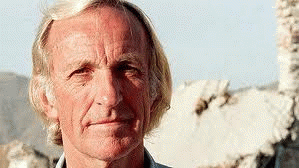An Interview With John Pilger
Dennis Bernstein: Noted Documentary Filmmaker, John Pilger, is somebody who knows a great deal about the Gaza Strip, and about the extreme conditions Palestinians there have been forced to endure under a Brutal Israeli Occupation. Pilger has actually made two films about it with the same name, twenty-five years apart: "Palestine is Still the Issue." Pilger, a London based Australian journalist, is a widely respected, Emmy award winning documentarian. His articles regularly appear world-wide in newspapers such as the Guardian of London, the Independent, the New York Times, Los Angeles Times.
JP: Thank you Dennis.
DB: You know a great deal about the situation. You've made not one film, Palestine is the Issue, but two. Let me get your initial response to we're continuing to hear reports of massive bombing and injury, and death to civilian life, to children.
JP: Well, the first thing is the...we should be disgusted. That is a normal, human response, to this. And the second is that we ought not to be surprised, but we should understand this has nothing to do with Hamas, or rockets. It is an ongoing assault on the Palestinian people. And especially the people of Gaza, which began a very long time ago and the plan is to effectively get rid of them as an entity. And I'm not exaggerating, it's often difficult to reach back to the history in times like this, but it's very important that we contextualize it.
The infamous Plan D that was executed in the late 1940s just before Israel came into being was to expel the population of Palestine; to get rid of them. And 369 villages were attacked, the people thrown out, the record is there. Historical record is very clear, Israeli historians, Benny Morris through, have documented this, the Hebrew archives have thrown it up.
The sum of it is that we see a form of genocide underway in Palestine. And this is the later stage. And what your listeners should be in no doubt about is that although Israelis are doing the bombing, it's really the United States that is really pushing the buttons. Because it's only Israelis who are flying the American planes. Those are American planes supplied for this very exercise, and if you look at the response of President Obama you understand that this is, in effect, an American/Israeli assault on a people who live in effectively an open prison.
The United Nations special reporter, Richard Falk, has likened their situation to the Warsaw Ghetto. When in Warsaw and Poland the Jewish Ghetto there rose up against the Nazis, who were crushed. These days fascism is not a word easily used, nor should it be. But we have as close to a fascist state in Israel, and those historic parallels that Falk draws, actually to be correct. So we're seeing an historical process at work here, and it is up to the rest of the world to recognize that, and do something about it.
DB: John, you've, as I mentioned in the introduction made not one film but two films with almost the same name, about twenty-five years apart. And that's Palestine is the Issue...why did you...
JP: Palestine is Still the Issue...
DB: And tell us about what that means, and why you did two films and what it means that they could almost have the same name twenty-five years apart.
JP: Well, the first film was in the late seventies and the second film was in about 2003. When I came, I'd been reporting the middle east and Palestine for quite a considerable time and when I came to make the second documentary what struck me, looking at the first documentary years before that nothing had changed that the title still applied, Palestine is Still the Issue.
It is the single issue in the middle east, because it is an issue of the most fundamental justice. It is, as I just explained, it is an issue of people fighting for their lives, literally, against an enemy that is an anachronism. Israel is...as the world was decolonizing, that is, the old empires were shedding their colonies. That's not to say a new empire wasn't arising, the U.S. empire. But the old colonies were being given at least a normal independence.
Against this historical tide, a new colony rose, and that's Israel. It's an utter anachronism. It is not in any way, in any sense, at peace with its region. It's at war with its region. In fact, its raison d'etre is war with its region. If it were to come to peace with its region then almost its reason for existing would stop. And this centers on the oppression and expulsion of Palestinians. The theft of their land, the theft of their resources, these are all facts. They're not opinions, they're facts. And they have been on the historical record for a long time. To almost everybody in the middle east, even in some of the more odious regimes, governed by some of the more odious regimes such as in the gulf, ordinary people regard Palestine as still the issue.
This center of turmoil and war, and a flashpoint, a permanent flashpoint in the world, would lose that volatile and very dangerous status when the Palestinians were given the fundamental justice to which they have a right. And it's Israel and the United States backed by Europe, but basically Israel and the United States that stands in that way. And that's why to ordinary people in the streets from Tehran to Cairo, and Damascus to Beirut, Palestine is still the issue. And it should be the issue in Los Angeles, and San Francisco, and London and wherever.
(Note: You can view every article as one long page if you sign up as an Advocate Member, or higher).






